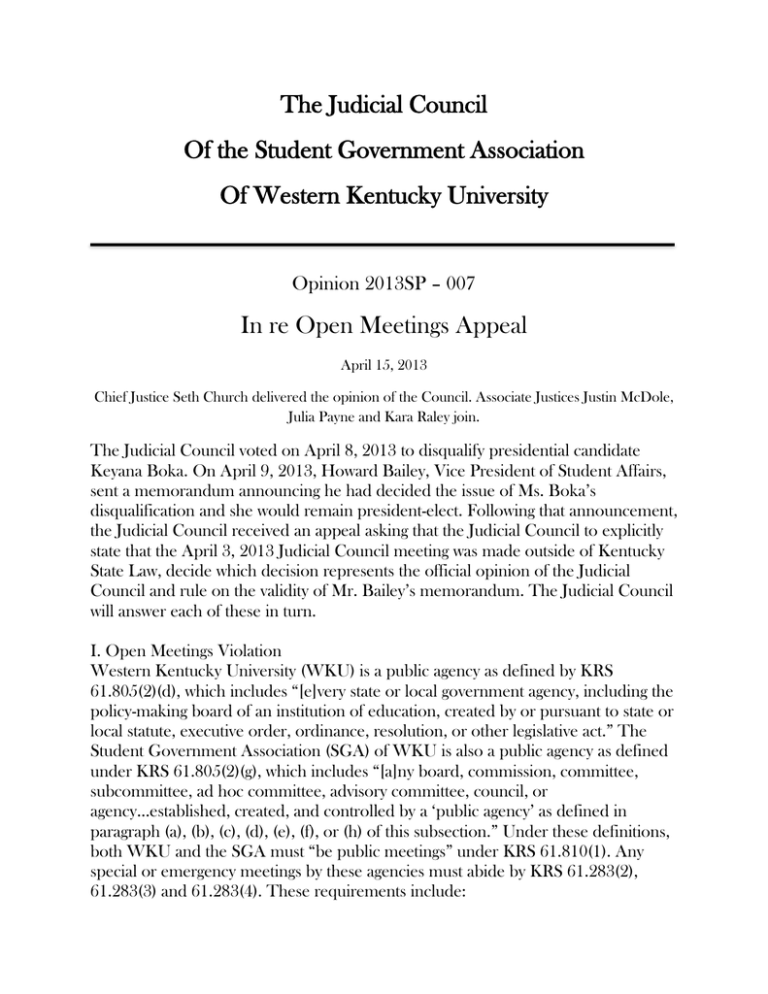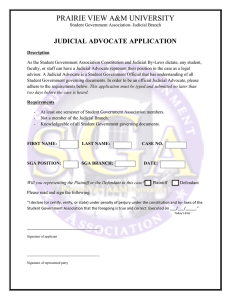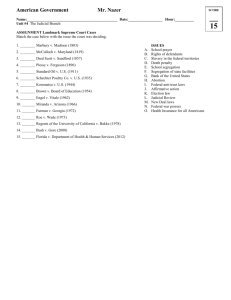The Judicial Council Of the Student Government Association Of Western Kentucky University
advertisement

The Judicial Council Of the Student Government Association Of Western Kentucky University Opinion 2013SP – 007 In re Open Meetings Appeal April 15, 2013 Chief Justice Seth Church delivered the opinion of the Council. Associate Justices Justin McDole, Julia Payne and Kara Raley join. The Judicial Council voted on April 8, 2013 to disqualify presidential candidate Keyana Boka. On April 9, 2013, Howard Bailey, Vice President of Student Affairs, sent a memorandum announcing he had decided the issue of Ms. Boka’s disqualification and she would remain president-elect. Following that announcement, the Judicial Council received an appeal asking that the Judicial Council to explicitly state that the April 3, 2013 Judicial Council meeting was made outside of Kentucky State Law, decide which decision represents the official opinion of the Judicial Council and rule on the validity of Mr. Bailey’s memorandum. The Judicial Council will answer each of these in turn. I. Open Meetings Violation Western Kentucky University (WKU) is a public agency as defined by KRS 61.805(2)(d), which includes “[e]very state or local government agency, including the policy-making board of an institution of education, created by or pursuant to state or local statute, executive order, ordinance, resolution, or other legislative act.” The Student Government Association (SGA) of WKU is also a public agency as defined under KRS 61.805(2)(g), which includes “[a]ny board, commission, committee, subcommittee, ad hoc committee, advisory committee, council, or agency…established, created, and controlled by a ‘public agency’ as defined in paragraph (a), (b), (c), (d), (e), (f), or (h) of this subsection.” Under these definitions, both WKU and the SGA must “be public meetings” under KRS 61.810(1). Any special or emergency meetings by these agencies must abide by KRS 61.283(2), 61.283(3) and 61.283(4). These requirements include: “The presiding officer or a majority of the members of the public agency may call a special meeting.” KRS 61.283(2) “The public agency shall provide written notice of the special meeting. The notice shall consist of the date, time, and place of the special meeting and the agenda.” KRS 61.283(3) “Written notice shall be delivered personally…or mailed to every member of the public agency as well as each media organization…The notice shall be calculated so that it shall be received at least twenty-four (24) hours before the special meeting.” KRS 61.283(4)(a) “As soon as possible, written notice shall also be posted in a conspicuous place in the building where the special meeting will take place and in a conspicuous place in the building which houses the headquarters of the agency. The notice shall be calculated so that it shall be posted at least twentyfour (24) hours before the special meeting.” KRS 61.283(4)(b) Under these requirements, the meeting held by the Judicial Council on April 3, 2013 was a violation of Kentucky Open Meetings Laws and should not be construed to represent the opinion of the Judicial Council or the SGA. The statute provides an exception to these requirements in KRS 61.283(5) which requires the agency to “make a reasonable effort, under emergency circumstances, to notify the members of the agency, media organizations…and the public of the emergency meeting.” These efforts were not made by the Judicial Council and nothing the Judicial Council has stated should be construed to imply that there was. Therefore, it is our opinion that the improperly held meeting on April 3, 2013 holds no weight with the Judicial Council or the SGA. The Judicial Council regrets this error in failing to comply with Kentucky Open Meetings Laws and the Judicial Council will take all appropriate measures to safeguard against violating these rules again. II. Official Position of the Judicial Council As detailed in part I of this opinion, the meeting held on April 3, 2013 holds no weight with the SGA and does not represent the opinion of the Judicial Council. The Judicial Council meeting held on April 8, 2013 was held in accordance with KRS 61.823 and was in compliance with Kentucky Open Meetings Laws. At this meeting, both sides were allowed to come and present their arguments and all five members of the Judicial Council were there. As such, this properly held meeting represents the official views of the Judicial Council and the SGA because the Judicial Council is given the power to interpret the Constitution and Bylaws and to enact and interpret Election Codes. This opinion details the feelings of the Judicial Council and the reasoning behind ruling to disqualify presidential candidate Keyana Boka. No other opinions should be construed as to deliver the opinion of the Judicial Council in this particular instance. III. Validity of Mr. Bailey’s Memorandum Whether or not the Judicial Council has any power to override the memorandum of Mr. Bailey is yet to be determined. However, it is the opinion of the Judicial Council that the memorandum issued by Mr. Bailey rests on a meeting held outside of Kentucky state law and should not have been within his powers to decide. Further, the Judicial Council would like to point out that this occasion is the first time that a judicial decision from the SGA has been overturned by an administrator. This event creates a dangerous precedent. From the moment Mr. Bailey issued that memorandum, he has allowed all student organizations to appeal to him for a final decision in any matter. This not only creates a major problem with the sovereignty and autonomy of student organizations but allows administrators to make final decisions in any and all decisions of student organizations. In addition, we believe this violates a clause from the Rights of Student Organizations created by the Office of Vice President Bailey, which states that “the Vice President of Student Affairs shall have no authority to prohibit any proposed action by a political organization.” While the SGA is undoubtedly classified as a “government organization” rather than a “political organization,” we believe this clause demonstrates the wishes of the University in keeping the administrators out of the affairs of student organizations. The Judicial Council and the SGA should be trusted to create and appropriately enforce our own rules. Whether Bailey’s decision was right or wrong and whether the decision issued by this Judicial Council is right or wrong is not the concern. The concern in this instance is that a member of the university administration made a decision for a student organization. It is not the role of the administration to step in on student matters unless they are of grave import to the University. For these reasons, we respectfully request that Mr. Bailey rescind the memorandum he wrote and allow the Student Government Association to administer the rules as we deem fit. If Mr. Bailey does not comply, the Judicial Council will support Candidate Alvey and Candidate Wingate as long as they wish to pursue this issue. It is so ordered. Chief Justice Seth Church Associate Justice Julia Payne, concurring in part and dissenting in part I concur with the opinion of the Judicial Council on all issues except for that of the validity of Mr. Bailey’s memorandum. While I agree with the Judicial Council that the memorandum issued by Mr. Bailey undermines the authority and the autonomy of the Student Government Association, I do not agree with the final statement of the opinion: “If Mr. Bailey does not comply, the Judicial Council will support Candidate Alvey and Candidate Wingate as long as they wish to pursue this issue.” I believe that the Judicial Council has already stated its opinion on this issue and that there is no reason to take further action on the matter.





